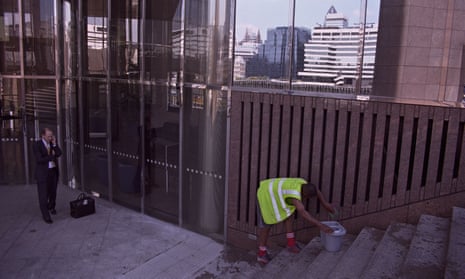Britain’s low pay culture traps people in poorly paid jobs and prevents them from escaping into full-time work with better pay, according to a major study by the government-backed body that tracks social mobility.
Only one in six workers on low pay managed in the last 10 years to push themselves up the pay ladder and stay there, while most remained stuck in a cycle of part-time and insecure jobs.
The analysis by the Social Mobility Commission found that a quarter of low-paid workers remained permanently stuck in low pay and nearly half (48%) fluctuated in and out of it over the course of the last 10 years.
Alan Milburn, the former Labour MP and health minister who heads the commission, said the study showed that successive governments had failed to reduce inequality between rich and poor despite two decades of interventions.
He described the situation as “endemic” and warned that without “radical and urgent reform”, the social and economic divisions in British society will widen even further, threatening community cohesion and economic prosperity.
His warning follows a stinging report earlier this week by the thinktank, the OECD, that accused the government of allowing regional and intergenerational divisions to worsen, leaving millions of people outside London and the south-east working in low-skilled jobs.
Milburn said workers on low incomes, defined as those earning below two-thirds of the median hourly wage, were caught in an “endemic low pay problem” that is “dire for social mobility”. The median hourly wage in 2016 was £13.59, defining those on low pay as earning below £9 an hour.
The study found that on average, people stuck in the low-pay trap have seen their hourly wages rise by just 40p over the last decade after inflation is taken into account, compared with a £4.83 pay rise for those who have permanently escaped.
The government has defended itself against claims that inequality has widened in the last 10 years by pointing to the Gini coefficient, which is an internationally recognised measure of income inequality that has remained constant in recent years.
But the Gini coefficient includes pensioners and those on benefits, while the commission’s research focuses on those in work.
Conor D’Arcy, a policy analyst at the Resolution Foundation, which carried out the research, said: “Britain has one of the highest proportions of low-paid work in the developed world. And while three-quarters of low-paid workers did manage to move into higher-paying roles at some point over the past decade, the vast majority couldn’t sustain that progress. This lack of pay progress can have a huge scarring effect on people’s lifetime living standards.
“The national living wage is playing a massive role in reducing low pay, but it can’t solve the problem alone. Employers need to improve career routes for staff, while government should support them with a welfare system that encourages progression at work.”
Milburn added: “Britain’s flexible workforce gives us global economic advantage but a two-tier labour market is now exacting too high a social price. A new approach is needed to break the vicious cycle where low skills lead to low pay in low quality jobs.
“Welfare policy should focus on moving people from low pay to living pay. Government should join forces with employers in a new national effort to improve progression and productivity at work. Without concerted action Britain will become more socially divided and social mobility will continue to stall.”









Comments (…)
Sign in or create your Guardian account to join the discussion